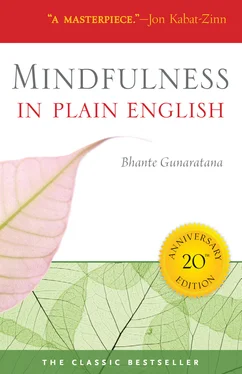Henepola Gunaratana - Mindfulness in Plain English
Здесь есть возможность читать онлайн «Henepola Gunaratana - Mindfulness in Plain English» весь текст электронной книги совершенно бесплатно (целиком полную версию без сокращений). В некоторых случаях можно слушать аудио, скачать через торрент в формате fb2 и присутствует краткое содержание. Жанр: Самосовершенствование, на английском языке. Описание произведения, (предисловие) а так же отзывы посетителей доступны на портале библиотеки ЛибКат.
- Название:Mindfulness in Plain English
- Автор:
- Жанр:
- Год:неизвестен
- ISBN:нет данных
- Рейтинг книги:3 / 5. Голосов: 1
-
Избранное:Добавить в избранное
- Отзывы:
-
Ваша оценка:
- 60
- 1
- 2
- 3
- 4
- 5
Mindfulness in Plain English: краткое содержание, описание и аннотация
Предлагаем к чтению аннотацию, описание, краткое содержание или предисловие (зависит от того, что написал сам автор книги «Mindfulness in Plain English»). Если вы не нашли необходимую информацию о книге — напишите в комментариях, мы постараемся отыскать её.
Mindfulness in Plain English — читать онлайн бесплатно полную книгу (весь текст) целиком
Ниже представлен текст книги, разбитый по страницам. Система сохранения места последней прочитанной страницы, позволяет с удобством читать онлайн бесплатно книгу «Mindfulness in Plain English», без необходимости каждый раз заново искать на чём Вы остановились. Поставьте закладку, и сможете в любой момент перейти на страницу, на которой закончили чтение.
Интервал:
Закладка:
From the Buddhist perspective, we humans have a backward view of life. We look at what is actually the cause of suffering and we see it as happiness. The cause of suffering is that desire-aversion syndrome which we spoke of earlier. Up pops a perception. It could be anything—a beautiful girl, a handsome guy, speed boat, thug with a gun, truck bearing down on you, anything. Whatever it is, the very next thing we do is to react to the stimulus with a feeling about it.
Take worry. We worry a lot. Worry itself is the problem. Worry is a process. It has steps. Anxiety is not just a state of existence but a procedure. What you’ve got to do is to look at the very beginning of that procedure, those initial stages before the process has built up a head of steam. The very first link of the worry chain is the grasping/rejecting reaction. As soon as some phenomenon pops into the mind, we try mentally to grab onto it or push it away. That sets the worry response in motion. Luckily, there is a handy little tool called Vipassana meditation which you can use to short-circuit the whole mechanism.
Vipassana meditation teaches us how to scrutinize our own perceptual process with great precision. We learn to watch the arising of thought and perception with a feeling of serene detachment. We learn to view our own reactions to stimuli with calm and clarity. We begin to see ourselves reacting without getting caught up in the reactions themselves. The obsessive nature of thought slowly dies. We can still get married. We can still step out of the path of the truck. But we don’t need to go through hell over either one.
This escape from the obsessive nature of thought produces a whole new view of reality. It is a complete paradigm shift, a total change in the perceptual mechanism. It brings with it the feeling of peace and rightness, a new zest for living and a sense of completeness to every activity. Because of these advantages, Buddhism views this way of looking at things as a correct view of life and Buddhist texts call it seeing things as they really are.
Vipassana meditation is a set of training procedures which open us gradually to this new view of reality as it truly is. Along with this new reality goes a new view of the most central aspect of reality: ‘me’. A close inspection reveals that we have done the same thing to ‘me’ that we have done to all other perceptions. We have taken a flowing vortex of thought, feeling and sensation and we have solidified that into a mental construct. Then we have stuck a label onto it, ‘me’. And forever after, we threat it as if it were a static and enduring entity. We view it as a thing separate from all other things. We pinch ourselves off from the rest of that process of eternal change which is the universe. And than we grieve over how lonely we feel. We ignore our inherent connectedness to all other beings and we decide that ‘I’ have to get more for ‘me’; then we marvel at how greedy and insensitive human beings are. And on it goes. Every evil deed, every example of heartlessness in the world stems directly from this false sense of ‘me’ as distinct from all else that is out there.
Explode the illusion of that one concept and your whole universe changes. Don’t expect to do this overnight, though. You spent your whole life building up that concept, reinforcing it with every thought, word, and deed over all those years. It is not going to evaporate instantly. But it will pass if you give it enough time and enough attention. Vipassana meditation is a process by which it is dissolved. Little by little, you chip away at it just by watching it.
The ‘I’ concept is a process. It is a thing we are doing. In Vipassana we learn to see that we are doing it, when we are doing it and how we are doing it. Then it moves and fades away, like a cloud passing through the clear sky. We are left in a state where we can do it or not do it, whichever seems appropriate to the situation. The compulsiveness is gone. We have a choice.
These are all major insights, of course. Each one is a deep-reaching understanding of one of the fundamental issues of human existence. They do not occur quickly, nor without considerable effort. But the payoff is big. They lead to a total transformation of your life. Every second of your existence thereafter is changed. The meditator who pushes all the way down this track achieves perfect mental health, a pure love for all that lives and complete cessation of suffering. That is not small goal. But you don’t have to go all the way to reap benefits. They start right away and they pile up over the years. It is a cumulative function. The more you sit, the more you learn about the real nature of your won existence. The more hours you spend in meditation, the greater your ability to calmly observe every impulse and intention, every thought and emotion just as it arises in the mind. Your progress to liberation is measured in cushion-man hours. And you can stop any time you’ve had enough. There is no stick over your head except your own desire to see the true quality of life, to enhance your own existence and that of others.
Vipassana meditation is inherently experiential. It is not theoretical. In the practice of mediation you become sensitive to the actual experience of living, to how things feel. You do not sit around developing subtle and aesthetic thoughts about living. You live. Vipassana meditation more than anything else is learning to live.
Chapter 4
Attitude
Within the last century, Western science and physics have made a startling discovery. We are part of the world we view. The very process of our observation changes the things we observe. As an example, an electron is an extremely tiny item. It cannot be viewed without instrumentation, and that apparatus dictates what the observer will see. If you look at an electron in one way, it appears to be a particle, a hard little ball that bounces around in nice straight paths. When you view it another way, an electron appears to be a wave form, with nothing solid about it. It glows and wiggles all over the place. An electron is an event more than a thing. And the observer participates in that event by the very process of his or her observation. There is no way to avoid this interaction.
Eastern science has recognized this basic principle for a very long time. The mind is a set of events, and the observer participates in those events every time he or she looks inward. Meditation is participatory observation. What you are looking at responds to the process of looking. What you are looking at is you, and what you see depends on how you look. Thus the process of meditation is extremely delicate, and the result depends absolutely on the state of mind of the meditator. The following attitudes are essential to success in practice. Most of them have been presented before. But we bring them together again here as a series of rules for application.
1. Don’t expect anything. Just sit back and see what happens. Treat the whole thing as an experiment. Take an active interest in the test itself. But don’t get distracted by your expectations about results. For that matter, don’t be anxious for any result whatsoever. Let the meditation move along at its own speed and in its own direction. Let the meditation teach you what it wants you to learn. Meditative awareness seeks to see reality exactly as it is. Whether that corresponds to our expectations or not, it requires a temporary suspension of all our preconceptions and ideas. We must store away our images, opinions and interpretations someplace out of the way for the duration. Otherwise we will stumble over them.
2. Don’t strain: Don’t force anything or make grand exaggerated efforts. Meditation is not aggressive. There is no violent striving. Just let your effort be relaxed and steady.
Читать дальшеИнтервал:
Закладка:
Похожие книги на «Mindfulness in Plain English»
Представляем Вашему вниманию похожие книги на «Mindfulness in Plain English» списком для выбора. Мы отобрали схожую по названию и смыслу литературу в надежде предоставить читателям больше вариантов отыскать новые, интересные, ещё непрочитанные произведения.
Обсуждение, отзывы о книге «Mindfulness in Plain English» и просто собственные мнения читателей. Оставьте ваши комментарии, напишите, что Вы думаете о произведении, его смысле или главных героях. Укажите что конкретно понравилось, а что нет, и почему Вы так считаете.












